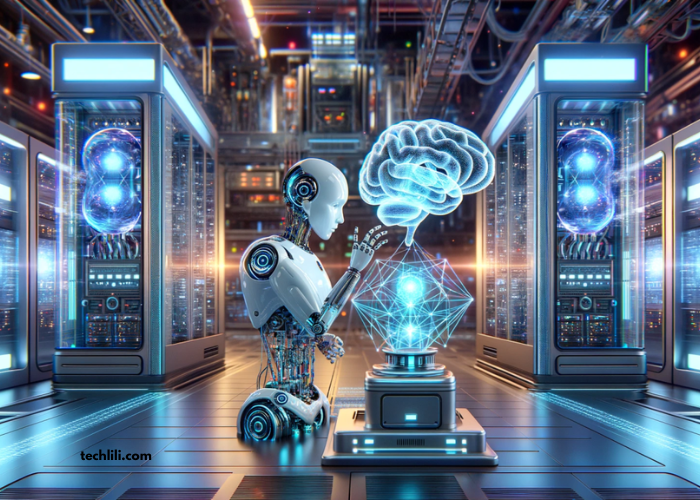The Future of AI: How Technology is Shaping 2024

Artificial Intelligence (AI) has become an integral part of our daily lives and is playing a pivotal role in shaping the future of technology. As we approach the year 2024, AI’s capabilities continue to expand, influencing industries, businesses, and societies in unprecedented ways. From healthcare to finance, entertainment to transportation, the implications of AI are vast and transformative. In this article, we explore how AI is evolving, the trends shaping its future, and the challenges and opportunities that lie ahead.
The Rise of AI: A Brief Overview
Artificial Intelligence is not a new concept. It has been in development for decades, but recent advances in computing power, data availability, and algorithmic innovation have accelerated its growth. AI encompasses various subfields, including machine learning (ML), natural language processing (NLP), computer vision, and robotics. These technologies are revolutionizing industries by automating tasks, making decisions, and enabling machines to learn and improve over time.
As we enter 2024, AI is no longer confined to research labs or science fiction. It has moved into the mainstream, driving innovations across sectors. From AI-powered chatbots in customer service to autonomous vehicles on the road, AI is creating a new era of technology that promises to reshape the way we live and work.
Key Trends in AI Development for 2024
1. AI-Powered Automation: Transforming the Workforce
One of the most significant trends in AI development is the growing adoption of automation across industries. AI-powered automation is revolutionizing the workforce, enhancing productivity and efficiency while reducing the need for manual intervention. By using AI to handle repetitive, time-consuming tasks, businesses can free up human workers to focus on more complex and creative endeavors.
In 2024, automation is expected to expand across sectors such as manufacturing, logistics, and healthcare. Robotic Process Automation (RPA) and AI-driven algorithms are streamlining workflows, reducing operational costs, and improving accuracy. For example, in healthcare, AI systems are assisting in diagnosing diseases, analyzing medical images, and predicting patient outcomes.
Impact on Employment
While AI automation brings undeniable benefits, it also raises concerns about its impact on jobs. Many tasks currently performed by humans may be replaced by AI-driven machines. However, experts argue that automation will not necessarily result in widespread job loss but rather a shift in job types and skills. As routine jobs are automated, there will be an increased demand for workers with expertise in AI, data analysis, and machine learning. Upskilling and reskilling the workforce will be crucial to ensuring that workers can adapt to this changing landscape.
2. AI and Healthcare: Advancements in Diagnostics and Treatment
Healthcare is one of the most promising fields for AI’s transformative impact. In 2024, AI is expected to play a crucial role in diagnosing and treating medical conditions. AI algorithms can analyze vast amounts of medical data, including patient histories, medical records, and diagnostic images, to identify patterns and make more accurate diagnoses than traditional methods.
For instance, AI is already being used to detect early signs of diseases such as cancer, heart conditions, and neurological disorders. AI-powered tools can also predict patient outcomes, assist in personalized treatment plans, and even recommend the most effective medications based on individual genetic makeup.
AI-Driven Drug Discovery
Another exciting development in AI is its potential to revolutionize drug discovery. Traditional drug development can take years and requires extensive human involvement. However, AI can significantly accelerate the process by analyzing vast datasets to identify promising compounds, predict their effectiveness, and even simulate clinical trials. This has the potential to speed up the discovery of life-saving drugs and treatments, making healthcare more accessible and efficient.
3. AI in Autonomous Vehicles: Revolutionizing Transportation
The transportation industry is undergoing a radical transformation, thanks to AI-powered autonomous vehicles (AVs). Self-driving cars, trucks, and drones are set to change the way goods and people move in 2024 and beyond.
AI algorithms, combined with sensors, cameras, and machine learning, enable autonomous vehicles to navigate roads, avoid obstacles, and make decisions in real time. These vehicles are expected to improve safety, reduce traffic congestion, and minimize human error. In addition, AI is helping optimize routes, lowering fuel consumption, and reducing environmental impact.
Challenges and Ethical Considerations
Despite the advancements in autonomous vehicle technology, challenges remain. The technology must continue to evolve to handle complex real-world driving scenarios, such as weather conditions, pedestrians, and unpredictable human behavior. Ethical considerations also play a critical role in the development of AI in transportation. Questions about accountability, privacy, and safety will need to be addressed as AVs become more widespread.
4. AI and Cybersecurity: Protecting Data and Privacy
As AI becomes more integrated into everyday life, cybersecurity is a growing concern. The proliferation of connected devices and digital platforms has created new vulnerabilities that malicious actors can exploit. In response, AI is being leveraged to enhance cybersecurity efforts by detecting threats, identifying anomalies, and responding to attacks in real-time.
AI-powered security systems are capable of analyzing large volumes of data and recognizing patterns indicative of cyberattacks. This enables faster detection of potential breaches, allowing organizations to respond swiftly and prevent damage. Machine learning algorithms can also adapt and evolve, making them better equipped to handle emerging threats and adapt to new attack techniques.
AI in Fraud Prevention
AI is already being used to combat financial fraud. Machine learning algorithms can analyze transaction data in real time, flagging suspicious activities and preventing fraudulent actions before they occur. In industries such as banking, insurance, and e-commerce, AI is helping reduce the risk of financial losses by proactively identifying fraudulent transactions.
5. Natural Language Processing (NLP): Enhancing Communication
Natural Language Processing (NLP) is a subfield of AI that focuses on enabling machines to understand and generate human language. In 2024, NLP is expected to make significant strides, improving communication between humans and machines.
NLP is already being used in virtual assistants like Siri, Alexa, and Google Assistant, but its applications are expanding further. AI-powered chatbots are enhancing customer service by providing quick, accurate responses to customer queries. NLP is also transforming industries such as content creation, translation services, and legal research by automating tasks that were once time-consuming and labor-intensive.
AI-Driven Content Creation
One of the most exciting developments in NLP is AI’s ability to generate human-like content. Tools like GPT-3 have demonstrated impressive capabilities in writing articles, generating marketing copy, and even composing poetry. In 2024, AI-driven content creation is expected to become even more advanced, making it easier for businesses to produce high-quality content at scale. However, the ethical implications of AI-generated content, such as issues of authorship and authenticity, will need to be addressed as the technology evolves.
Challenges and Ethical Considerations in AI Development
While AI presents numerous opportunities, its rapid development also raises several challenges and ethical concerns. As AI continues to advance, it is essential to address these issues to ensure the responsible and equitable use of AI technologies.
1. Bias in AI Algorithms
One of the most pressing concerns in AI is bias. AI systems are trained on data, and if the data used to train these systems is biased, the AI algorithms can produce biased outcomes. For example, AI used in hiring or loan approval processes could perpetuate existing inequalities if the training data reflects historical biases. To mitigate this, it is crucial to ensure diverse and representative datasets are used in training AI models.
2. Data Privacy and Security
As AI systems rely on vast amounts of data, concerns about data privacy and security are growing. Ensuring that personal and sensitive data is handled responsibly is critical to building trust in AI technologies. Striking the right balance between data collection and privacy protection will be essential in the years to come.
3. Regulation and Accountability
With the increasing adoption of AI, governments and regulatory bodies will need to establish clear guidelines for its use. These regulations should address issues such as data protection, algorithmic transparency, and accountability. In the event of an AI-related failure or harm, it is important to determine who is responsible for the consequences and how liability should be handled.
The Future of AI: What to Expect in 2024 and Beyond
As we look toward the future, AI will continue to evolve and redefine industries. In 2024, we can expect to see the following developments:
- AI-Driven Personalization: AI will further enhance personalized experiences in sectors like retail, entertainment, and healthcare. Machine learning algorithms will enable businesses to deliver more tailored recommendations and solutions to customers.
- Collaboration Between Humans and AI: Rather than replacing humans, AI will increasingly work alongside people to augment their abilities. In fields such as creative industries, healthcare, and education, AI will become a powerful tool for enhancing human creativity and decision-making.
- AI in Sustainability: AI will play a crucial role in addressing global challenges such as climate change and resource management. AI-powered solutions will help optimize energy usage, reduce waste, and promote sustainability in various industries.
- Ethical AI Development: With growing awareness of the potential risks of AI, there will be a stronger focus on developing ethical AI systems that prioritize fairness, transparency, and accountability.
Conclusion
The future of AI is bright, with technology continuing to evolve and shape the world around us. As we enter 2024, AI’s influence will only grow, transforming industries, enhancing efficiency, and solving complex problems. However, the development of AI must be accompanied by careful consideration of its ethical implications, ensuring that AI is used responsibly and for the benefit of society.
AI is no longer a futuristic concept—it is here, and its impact is already being felt. By embracing the opportunities and addressing the challenges, we can ensure that the future of AI is one that benefits everyone.




